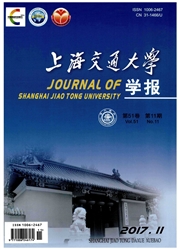

 中文摘要:
中文摘要:
为了应对节能减排及汽车安全性的双重要求,先进高强钢的开发和应用受到愈来愈高的重视.超高强度钢板热冲压成形技术是减轻车身重量、提高汽车抗冲击和防撞性能的重要途径,目前已经成为世界汽车制造行业的热门技术.成形极限是硼钢热冲压成形过程中一个非常重要的表征参数,但由于高温半球形凸模胀形试验(Nakazima)的复杂性造成实验测试面临诸多困难.针对硼钢热冲压成形过程特点,提出将韧性损伤模型与有限元数值模拟技术结合起来预测硼钢高温成形极限的方法.在连续体损伤力学基础上,建立了考虑有效应力和等效塑性应变对微孔损伤影响的勒迈特(Lemaitre)韧性损伤演化方程,在损伤耗散势函数中引入了等效塑性应变因子,从而寻找到能够准确反映硼钢在奥氏体状态下的成形特性的勒迈特耗散势函数.选取基于遗传算法的基于非支配排序的多目标优化算法(NSGA-II)与有限元分析软件"FORGETM"相结合的方法优化韧性损伤模型中材料的损伤因子,并利用优化后的损伤因子准确预测到板料成形过程的拉伸失稳和断裂现象.将建立的韧性损伤模型引入到硼钢高温半球形凸模胀形有限元仿真模型中,通过预测的成形极限与实验测定结果的比较,验证了所提韧性损伤模型预测硼钢高温成形极限的可靠性.
 英文摘要:
英文摘要:
To meet the requirement of energy saving and automobile safety, more and more attentions are paid to the development and application of high strength steels. Hot stamping of ultra high strength steel is an important way to reduce the weight of body-in-white, improve the anti-impact and anti-collision performance of the vehicle, and has become a hot technology in the world wide. The forming limit is a very important parameter in boron steel hot stamping process. Due to the complexity of the Nakazima test at elevated temperature, there are a lot of problems to be solved. In the paper, the ductile damage model and finite element simulation technology were combined to predict the forming limit of boron steel at elevated temperature. Based on the continuum damage mechanics (CDM), the Lemaitre ductile damage model considering the effect of effective stress and effective plastic strain on evolution of microvoid was established. In order to accurately predict the formability of boron steel at elevated temperature, a modified dissipation potentialcoupling the effect of plastic strain was introduced. Genetic Algorithm-II (NSGA-II) was integrated with finite element software FORGETM to find the optimized ductile damage parameters. The obtained damage parameters can accurately predict the sheet instability and fracture behaviour in tensile test. The established ductile damage model is introduced in the simulation of Nakazima test with boron steel. The comparison between the predictedforming limit and that of experiment witnesses the reliability of the forming limit prediction at high temperature using the proposed ductile damage model.
 同期刊论文项目
同期刊论文项目
 同项目期刊论文
同项目期刊论文
 期刊信息
期刊信息
